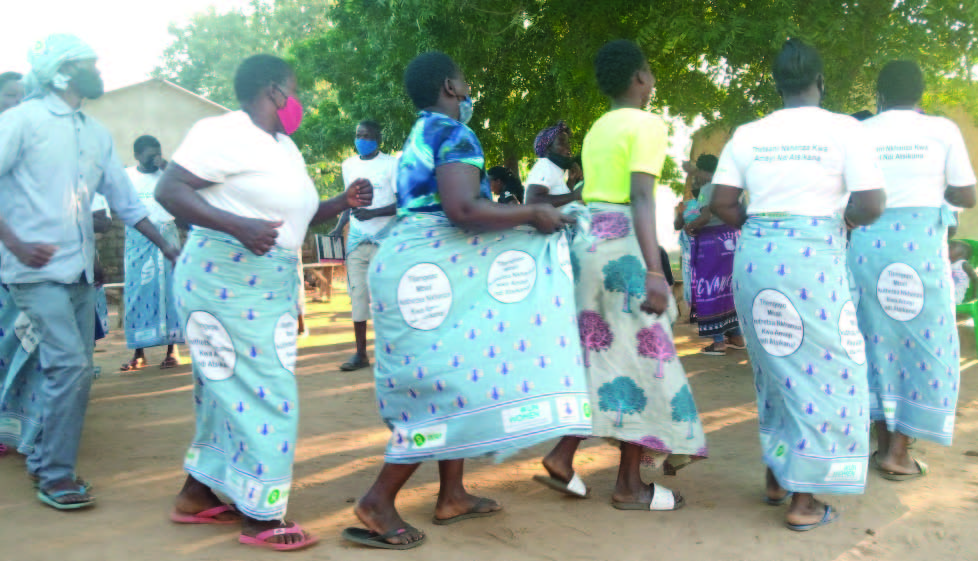Making girls education cool
At 14, Tiyanjane Chafungatira, from Ndenguma Village in Nsanje, dropped out of school because of poverty.
Her mother, Lucia Seveni, who depended on alms and piecework, struggled to meet the everyday needs of her three children.

Tiyanjane says: “I was in Standard Four at Kapalakonje Full Primary School when my mother forced me to drop out and help her fend for the family.
“Life was tough. I had to do back-breaking piecework for low pay while my friends were going to school.”
Seven says worsening poverty prompted her to halt her first-born girl’s education.
The United Nations Population Fund (UNFPA) reports that nearly six in 10 Malawian girls drop out of primary school and only 25 percent of girls complete primary education.
“I needed Tiyanjane to contribute in any way whatsoever to feed and support her siblings,” Seveni recalls.
With a K3 000, Tiyanjane started selling home-baked fritters in the neighbourhood and at her school. However, the business hardly generated enough revenue for the woman-headed family of four.
“My siblings could go to school on an empty stomach because our little income wasn’t enough for two meals a day,” she says.
However, Tiyanjane, now 16, returned to school after two terms after being approached by members of a circle of neighbours who discuss ways to end violence against women and girls in the territory of Senior Chief Malemia.
The star circle is part of a project being implemented by Oxfam and Women’s Legal Resources Centre (Wolrec) to help communities understand the importance of promoting girls’ rights.
Educating girls
Through Ndenguma Star Circle, change agents remind the rural community of its responsibility to keep girls in school and out of harm’s way.
Tiyanjane, who aspires to be a doctor, thanks the group for safeguarding her right to education.
Says Star Circle chairperson Fortunate Mpasanje : “ As members of the star circle, we engage women such as Seveni to appreciate the importance of educating girls who are persistently at risk of getting pregnant and marrying young.
“We acted swiftly to bring Tiyanjane back to school and empower her mother because we now understand that promoting girls’ education breaks a vicious cycle of poverty. Learned girls are more empowered, healthier and earn more than dropouts. This is necessary for building a bright future for themselves, their families, areas and country.”
Mpasanje says they persuade parents to learn, not to fend for their families.
Seveni accepted to let her daughter return to school because “I wish her well”.
“I realised that denying her right to education was denying her a chance to acquire education and relevant skills so she can get a job to support herself and the family.”
Seveni now provides for her family after obtaining a soft loan from the circle’s village savings and loan (VSL). She got K23 000, which she invested in her fritters and footwear business.
Pemphero Gale, 19 also thanks the star circle for terminating her illicit marriage and luring her back to school after giving birth.
“The teen pregnancy pushed me into a child marriage with a violent man in 2017 and my future looked bleak. Had the women from the star circle not rescued me, I would have been stuck in that hell,” she says.
Pemphero is now in Form Two at Nsanje Secondary School, pursuing her dream to become a nurse. She is one of the 10 teen mothers that have re-enrolled since 2019.
Loyce Harawa, Wolrec project officer, says promoting girls’ rights is key to ending violence against women and girls.
“Educated girls do not marry young, which reduces child marriages. School provides an opportunity to get a job that earns them money, giving them a say over their bodies and life. They will stand up against any form of abuse and exercise their rights freely,” she explains.
Bankrolled by UN Women through UN Trust, the project has empowered communities to demand access to basic services from duty-bearers as a way of ending gender-based violence (GBV) that disproportionately affect women and girls.
Christopher Billy, a member of Malemia Community Action Group, says community members are now committed to curb GBV cases.
“We have raised awareness on human rights and ways to fight against physical, sexual, economic and psychological abuse. We want empowered women and increased school completion rate among girls for sustainable development here,” he says.
Community action
Group village head Mvundula says the community awareness initiative challenged him to ramp up measures to promote the welfare of women and girls.
“I have formulated child protection by-laws for girls to be in school, not in marriages or fending for their families. I have also refined and banned some harmful cultural practices to empower women for the area to be developed sustainably,” he says.
Oxfam gender programme officer Sarah Kambilinya is pleased with the strides in helping women and girls live to their full potential.
“This will accelerate development because empowered women usually use their incomes to provide for their families. Such support goes a long way in ensuring children, especially girls become proactive citizens,” she says.
And Nsanje district social welfare officer Emmanuel Mbenuka says: “Involvement of community structures assures us of sustainable complementing efforts to ending these vices in the district.”





